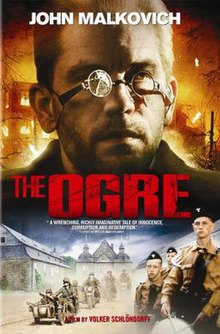
Michael Laurence Nyman, CBE is an English composer, pianist, librettist, musicologist, and filmmaker. He is known for numerous film scores, and his multi-platinum soundtrack album to Jane Campion's The Piano. He has written a number of operas, including The Man Who Mistook His Wife for a Hat; Letters, Riddles and Writs; Noises, Sounds & Sweet Airs; Facing Goya; Man and Boy: Dada; Love Counts; and Sparkie: Cage and Beyond. He has written six concerti, five string quartets, and many other chamber works, many for his Michael Nyman Band. He is also a performing pianist. Nyman prefers to write opera over other forms of music.
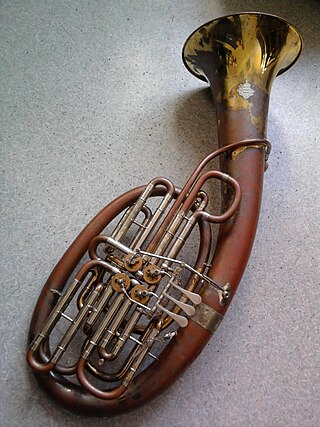
The Wagner tuba is a four-valve brass instrument commissioned by and named after Richard Wagner. It combines technical features of both standard tubas and French horns, though despite its name, the Wagner tuba is more similar to the latter, and usually played by horn players. Wagner commissioned the instrument for his four-part opera cycle Der Ring des Nibelungen, where its purpose was to bridge the acoustical and textural gap between the French horn and trombone.

Michel Tournier was a French writer. He won awards such as the Grand Prix du roman de l'Académie française in 1967 for Friday, or, The Other Island and the Prix Goncourt for The Erl-King in 1970. His inspirations included traditional German culture, Catholicism and the philosophies of Gaston Bachelard. He resided in Choisel and was a member of the Académie Goncourt. His autobiography has been translated and published as The Wind Spirit. He was on occasion in contention for the Nobel Prize in Literature.
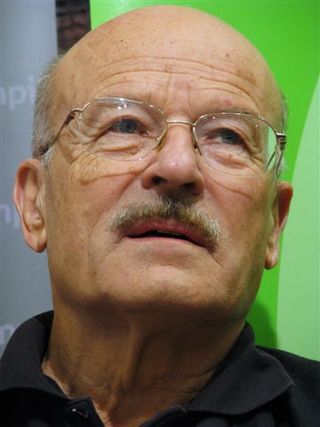
Volker Schlöndorff is a German film director, screenwriter and producer who has worked in Germany, France and the United States. He was a prominent member of the New German Cinema of the late 1960s and early 1970s.
Facing Goya (2000) is an opera in four acts by Michael Nyman on a libretto by Victoria Hardie. It is an expansion of their one-act opera called Vital Statistics from 1987, dealing with such subjects as physiognomy, eugenics, and its practitioners, and also incorporates a musical motif from Nyman's art song, "The Kiss", inspired by a Paul Richards painting. Nyman also considers the work thematically tied to his other works, The Man Who Mistook His Wife for a Hat, The Ogre, and Gattaca, though he does not quote any of these musically, save a very brief passage of the latter. It was premièred at the Auditorio de Galicia, Santiago de Compostela, Spain on 3 August 2000. The revision with the cast heard on the album premiered at the Badisches Staatstheater Karlsruhe, Germany, on October 19, 2002. Vital Statistics has been withdrawn. The Santiago version included more material from Vital Statistics. The opera was most recently performed at the 2014 Spoleto Festival USA, located in Charleston, South Carolina.
The Michael Nyman Band, formerly known as the Campiello Band, is a group formed as a street band for a 1976 production of Carlo Goldoni's 1756 play, Il Campiello directed by Bill Bryden at the Old Vic. The band did not wish to break up after the production ended, so its director, Michael Nyman, began composing music for the group to perform, beginning with "In Re Don Giovanni", written in 1977. Originally made up of old instruments such as rebecs, sackbuts and shawms alongside more modern instruments like the banjo and saxophone to produce as loud a sound as possible without amplification, it later switched to a fully amplified line-up of string quartet, double bass, clarinet, three saxophones, horn, trumpet, bass trombone, bass guitar, and piano. This lineup has been variously altered and augmented for some works.
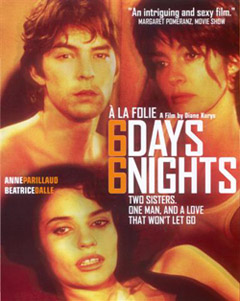
À la folie is a 1994 French drama film by Diane Kurys with music by Michael Nyman. It entered the competition at the 51st Venice International Film Festival.

The Michael Nyman Songbook is a collection of art songs by Michael Nyman based on texts by Paul Celan, Wolfgang Amadeus Mozart, William Shakespeare and Arthur Rimbaud. It was recorded as an album with Ute Lemper in 1991, and again as a concert film in 1992, under the direction of Volker Schlöndorff, again with Ute Lemper, though many of the musicians had changed. The songs have been recorded by others and as instrumentals, and are published by Chester Music. The album has been issued by both London Records and Argo Records, though the covers are the same except for the logo.
Nigel Barr grew up as a member of the High Wycombe Salvation Army band. In 1980 he went to the Guildhall School of Music and studied trombone with Peter Gane and Denis Wick during that time he was also a member of International Staff Band (1980–82) playing bass trombone.
Love Counts is a 2005 opera in two acts by Michael Nyman to a libretto by Michael Hastings.

The Essential Michael Nyman Band is a studio album featuring a collection of music by Michael Nyman written for the films of Peter Greenaway and newly performed by the Michael Nyman Band. It is the seventeenth album release by Nyman. The album features liner notes by Annette Morreau, who describes the album as "a summation and digest of ten years of progress in the performance of music by a composer -- a composer with whom, so evidently, a group of friends and expert musicians intimately identify their total commitment, virtuosity, and joyous enthusiasm."
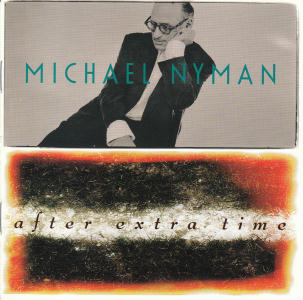
After Extra Time is a 1996 album by Michael Nyman with the Michael Nyman Band containing three tributes to Nyman's fandom of Association football: After Extra Time, the soundtrack to The Final Score, and Memorial. The latter is described as a remix, but is simply the 1992 recording from The Essential Michael Nyman Band. It was included in order to put it together with his two other football-inspired works. The album lists only three tracks, which has caused it to be erroneously reported that Memorial is track 3 and the others are all hidden tracks, but Memorial is track 26. Therefore, a track listing, as the individual portions of the pieces are not named, is not useful. The three pieces were recorded at separate times and thus have separate personnel lists.
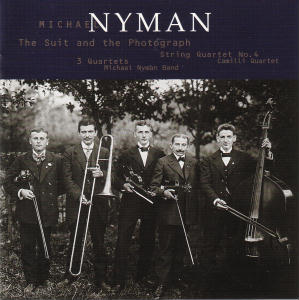
The Suit and the Photograph is a 1998 album by Michael Nyman with the Michael Nyman Band, recorded in 1995. On this album, Nyman is the composer, conductor, and producer, and wrote the liner notes. The album contains two works, String Quartet No. 4 and 3 Quartets. The album is named for its cover photograph by August Sander, which Nyman had associated with the Michael Nyman Band since its inception in 1977. He cites a description of the photograph by John Berger, in an essay of the same title, describing that the suits deform the working class rural men just enough to "undermine physical dignity." Both of the pieces on the album originated in Japan. It is Nyman's second release on EMI and his 33rd in general, but is not designated part of a series, as EMI had done with Concertos. Said Nyman of EMI, "I didn't excite them, and they didn't excite me." Nyman's only further releases on EMI would be the UK edition of Ravenous, featuring remixes by William Orbit, and The Actors, both film scores.

The Composer's Cut Series Vol. I: The Draughtsman's Contract is the 51st album by Michael Nyman, recorded in 2005 with the Michael Nyman Band and released in 2006. It is the first in an unprecedented series in which Nyman began rerecording some of his film music independently of the needs of film production, and the culmination and refinement of 23 years of performances of the work since the recording of the original 1982 recording of The Draughtsman's Contract.

The Very Best of Michael Nyman: Film Music 1980–2001 is a compilation album film music by Michael Nyman. It was released on November 6, 2001 by Virgin Records. It including three previously unreleased tracks and one from the limited release, La Traversée de Paris. Some tracks are from the original soundtracks, while others are from pre-existing rerecordings such as The Essential Michael Nyman Band and Live.

The Composer's Cut Series Vol. II: Nyman/Greenaway Revisited is the second in a series of albums, all released on the same day, by Michael Nyman to feature concert versions of film scores, in this case, films of Peter Greenaway, and his 52nd release overall. The album is similar to The Essential Michael Nyman Band, although a number of tracks are on only one album or the other. In spite of being recorded in 1992, with the same lineup, Memorial is not the same performance as the one that appears on The Essential Michael Nyman Band or After Extra Time, which was recorded in Tokyo. This performance was recorded in London and is slightly less aggressively performed.

Wonderland is the 38th album release by British composer Michael Nyman and the soundtrack to the 1999 film Wonderland. It is the first of many collaborations of Nyman with director Michael Winterbottom. For Winterbottom, Nyman would later perform excerpts of this score in 9 Songs, provide a score for The Claim, and arrangements and re-used tracks for A Cock and Bull Story. Nyman's daughter, Molly, has continued the family working relationship with Winterbottom, scoring The Road to Guantanamo with Harry Escott.

The Erl-King is a 1970 novel by the French writer Michel Tournier. It is also known as The Ogre. The novel received the Prix Goncourt. The 1996 film The Ogre, directed by Volker Schlöndorff, is based on the novel.

Daniel Herskedal is a Norwegian jazz tubist. He is regarded as one of the most talented jazz tubists in Norway.
